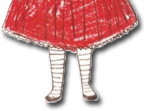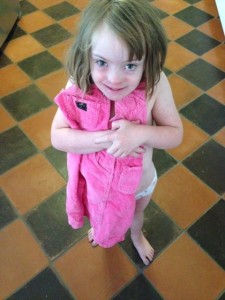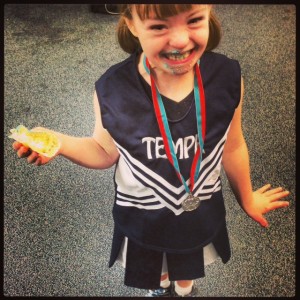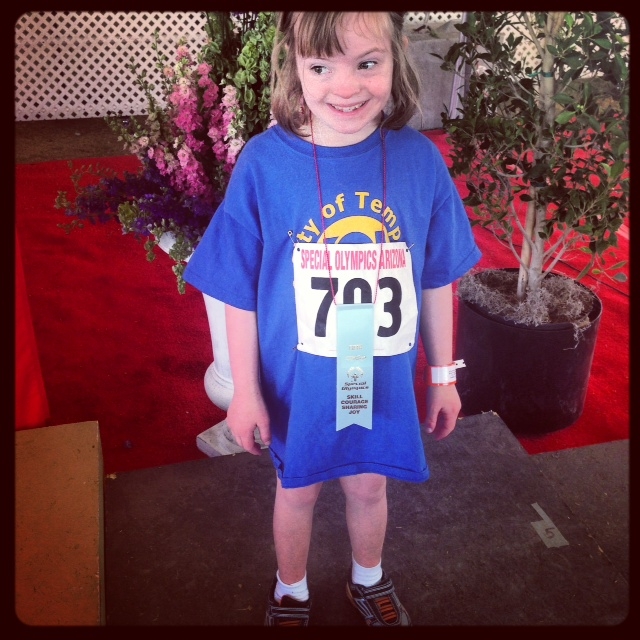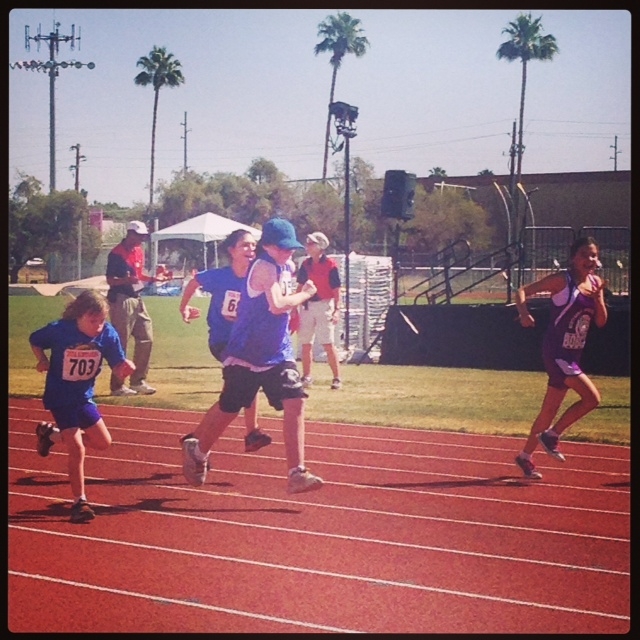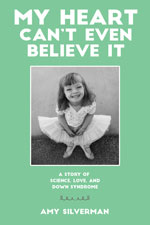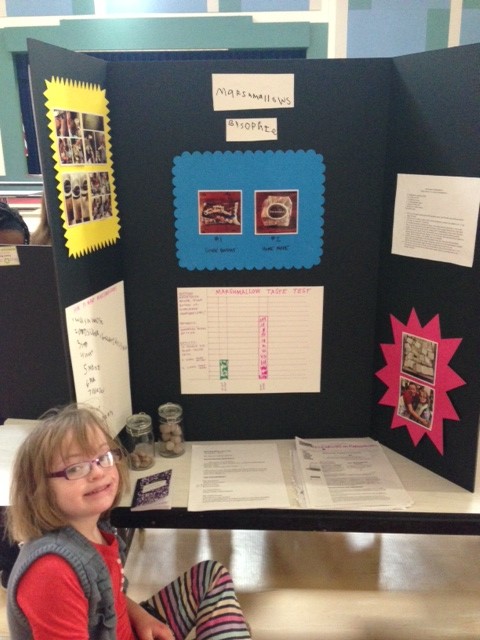
I read this piece earlier this month at Lit Lounge, a way cool program sponsored by the Scottsdale Museum of Contemporary Art, headed up by the amazing Tania Katan. If you haven’t been, you should go — next month’s line-up includes my friend Laurie Notaro. Go to smoca.org for details and to purchase tickets.
It’s pretty safe to say that I am not Science Girl.
I practically had to be hospitalized on the first day of high school biology, when the teacher shared the news that we’d be dissecting frogs later in the year. Chemistry was no better – unlike my classmates, I had no desire to blow anything up. And something, years before, had literally turned the chemistry teacher blue. He looked like a Smurf. If that’s not enough to scare you off science, I don’t know what is.
My worst encounter with the subject, by far, took place during the eighth grade science fair. That was back in the days before your parents did your homework. Not that my parents did my homework. Nobody did, which explains my grades.
But you couldn’t skip the science fair. It was mandatory. You had to actually show up with one of those tri-fold boards and evidence of an experiment. I decided to test the strength of two different brands of yarn, which has got to be the dumbest idea for a science fair project, ever.
It did mean one of my favorite things in the world — a trip to the craft store. I don’t remember much about the actual science of that science fair project, but I recall standing in Hobby Hut for a really long time, picking out just the right shades of yarn. I think I wound up with that super cool tri-color stuff.
I do also have fuzzy memories of hoisting large buckets of water and trying to get the yarn to break. Turns out, yarn is stronger than you might think.
Total disaster. Such a disaster, in fact, that it drew not only the attention but also the ire of the meanest teacher at Ingleside Middle School, the eighth grade science teacher, Mr. Done.
Mr. Done was a small but fierce man who ungraciously refused to ignore the fact that I didn’t pay attention in his class, and I seriously contemplated suicide to avoid having to deal with Mr. Done and finish that science fair project.
“That’ll teach him!” I’d think as I tossed and turned at night, picturing Mr. Done standing sad and alone at my funeral, while my friends and family sobbed, whispering behind his back, “If only he’d been nicer to Amy about her science fair project.”
So yeah, I’m damaged goods. But aren’t we all?
Turns out, it’s not so hard to avoid science in every day life. I chose my college based on the fact that there was no math requirement and you only had to take these fake, half semester science classes with names like “The Biology of Islands.” Perfect.
I chose a profession where you’re not required, really, to know much about anything (journalism) and married Ray, a guy who’s really into science, which is a big help when you need to decide which kind of light bulbs to buy or why the hot water heater’s not working. Ray’s even taught me a thing or two – like how to find Jupiter in the night sky and what makes Camelback Mountain red.
But there was something neither of us could see in the stars. When the nurses in the maternity ward agreed that it looked like our younger daughter, Sophie, had Down syndrome, Ray ran downstairs to the hospital’s medical library, while I sat in bed and cried. Over the years, he’s tried to explain Trisomy 21 to me a bunch of times, but it’s never really stuck, all those numbers and symbols.
Is chromosome spelled with an m or an n? I can never remember. But one thing he said early on resonated with me.
When Sophie was just a few days old, Ray remarked, “You know, Sophie really shouldn’t be alive. Don’t you realize that every single bit of her is different from every bit of us? It’s a miracle. It’s like she’s our own little science experiment.”
“Oh fuck,” I thought. “Can I do this?”
Turns out, I can, because as you might expect, Sophie quickly went from being a lab rat to a tiny human being. Doctors mended a hole in her heart, therapists taught her to walk and talk. Some days I still stare at her toes and think, “Wow, those toes look so different from the rest of the toes in our house! Science experiment!”
But for the most part, she’s just Sophie.
When she was 4, one of her therapists insisted that Sophie’s fine motor skills were so bad, she’d never write her own name. Sophie’s kindergarten teacher proved that therapist wrong by the end of the first week of school, and her teachers have continued to surprise everyone (including themselves, I think) with what they’re able to teach our kid.
Which is good, since I’d much rather take Sophie to the mall or a museum — or do just about anything with her – than teach her math. Or science.
It works out really well until the second week of January each year, when Sophie comes home with the packet for the school science fair.
The whole thing is strictly voluntary. But after several years, I know not to try to duck out of the science fair. Sophie loves it. She brings that packet home like a new kitten. A kitten I’m expected to keep alive. Over the years, we’ve fallen into a pattern where Ray helps our older daughter, Annabelle, do her science fair project, while I help Sophie.
At first, it wasn’t so bad. The expectations in kindergarten and first grade aren’t high; I got away with a rock collection and one of those magic crystal gardens you leave out wet overnight.
In second grade, Sophie learned how a carousel works; I took her to ride one and interview the people who run it, and a friend of ours built her a carousel out of styrofoam, rubberbands and skewers. Sophie decorated the horses and we glued them on together.
The rules got more complicated in third grade. I looked at the print outs until my eyes crossed. I don’t know what a variable is – and more important, how am I going to figure out how to explain that to Sophie?
I tossed the packet aside. Screw hypotheses and graphs. We were going to learn how to make butter. From scratch.
Do you have any idea how hard it is to find a lactating goat in Phoenix in January?
I do.
With the deadline for the project looming, I finally settled on some non-lactating goats at the farmers market and convinced a local chef to let us into her kitchen to watch her whip cream into butter. Then we went home and took an empty water bottle, filled it with cream, and Sophie shook it (well, Sophie shook it for about 5 seconds, then I shook it) til we made butter.
I documented the whole thing in photos, had Sophie dictate her “report” and dropped it off at school, feeling rather smug.
A few days later, the babysitter picked up Sophie and the science fair project. I got a text: You’re not going to want to read the judge’s comments on Sophie’s project.
Sophie bombed. Okay, I bombed. The judge was not impressed with the goats or the chef or the fact that we’d actually turned a liquid into a – well, I’m not sure what butter is but it’s different from cream. The judge actually wanted the variables and hypotheses and all that crap.
I vowed that the following year, we’d skip the science fair.
Then Sophie came home with this year’s packet and a big smile. What could I do? Before I knew it, we were in another chef’s kitchen, making marshmallows.
“Just don’t read the judge’s comments this time,” the babysitter suggested.
Good advice.
I took a bunch of pictures – mostly of Sophie holding the digital candy thermometer and looking really scientific – then I went to the store and bought the regulation tri-fold board, and several bags of tiny white marshmallows.
“Hey Sophie,” I said, “We can write out the title of your science fair project in marshmallows! Won’t that be cute? What do you want to call it?”
She thought for a minute.
“Happy Marshmallow Day!”
I imagined that at the science fair. Not good.
Look, here’s the thing: I want more than anything to let Sophie be herself, but if she’s going to be mainstreamed with typical kids her age, she’s got to at least make it on the dart board. She’s got to stop sucking her thumb at school; she can’t hug every stranger she sees; and she can’t call her science fair project “Happy Marshmallow Day.”
We couldn’t do her science fair project Sophie-style – not entirely.
And so I did what any 21st century mom with no self-respect would do. I got on facebook and begged for help.
My friends meant well, but their advice included terms like “bell jar” and “surface tension.” I started to panic.
As luck would have it, I have another friend who also happens to be a science teacher. And she knows Sophie really well.
“Have her do a taste test,” she said. “Store bought versus homemade.”
She showed me how to make a simple bar graph. I took notes. I was ready.
Sophie was thrilled. It was the perfect experiment for a kid who loves to interact with people. I pasted photos on her board, and Sophie wrote “Marshmallows by Sophie” in Sharpie. We typed her “report” together. I drew the bar graph and she colored it in.
We walked into the gym and set up Sophie’s tri-fold board alongside the other fourth grade science fair projects. Two of Sophie’s classmates walked over to check out what she’d done. I asked them about their projects.
“I made electricity,” one girl said.
“I didn’t do a science fair project,” the other said.
OK, so Sophie fell somewhere in the middle. That made me feel pretty good.
A few days later, the judge’s packet came home. Inside was a first place ribbon, and a near perfect score.
At first I was thrilled, then almost immediately skeptical – had one of my Facebook friends from school rigged the judging? Did Sophie really deserve such a high score? Last year I was mad that the judge was too hard on a kid with special needs. Was it the opposite this year? Was the judging dumbed down?
Could I quit overthinking this?
In the end, I had my moment of clarity, brought to me by Sophie herself.
Turns out, she couldn’t care less what place she got in the science fair.
She’s just thrilled that the ribbon is purple – her favorite color.

 I dropped a penny in the check-out line at Safeway the other night. Knowing she’d be into it, I called Sophie over.
I dropped a penny in the check-out line at Safeway the other night. Knowing she’d be into it, I called Sophie over.
